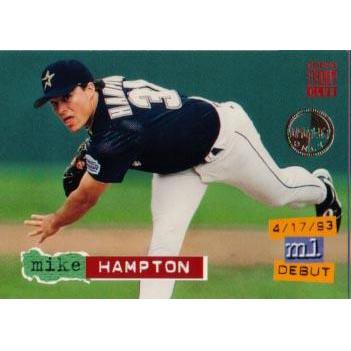 |
| 1994 Stadium Club Members Only # 614 |
In addition, the mere four losses he incurred in winning those 22 put him in some pretty good company, all-time. Since 1900, only nine guys were able to win twenty while losing four or less--including hurlers like Lefty Grove, Roger Clemens, and Whitey Ford. Only two--in the 20th century mind you--were able to win 20 while losing less than Hampton's 4; Preacher Roe for Brooklyn in 1951, and David Cone for the f@#$ing Mets in 1988. Lefty Grove's 1931 season (31 - 4 with a 2.06 in a year when the park-adjusted league ERA was 4.51) remains the finest season by a southpaw since 1900. But I believe Hampton's 1999 season was the second finest pitching performance by a lefthander in the modern era. And yes, I consider Steve Carlton's 1972 season when I say this. Needless to say, Hampton's '99 season is not just the only time in Astro history when a lefty has won 20, it is also the only a time a 20-game winner for Houston has had losses in single digits.
|
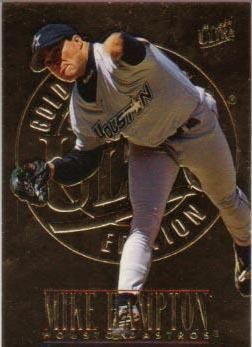 |
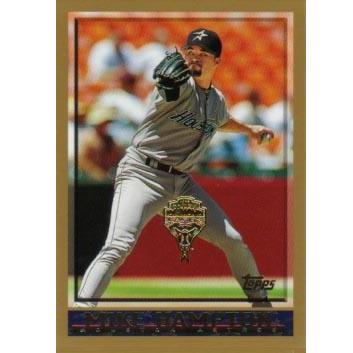 |
| 1996 Fleer Ultra Gold Medallion # 209 |
1998 Topps Diamondbacks Inaugural # 226 |
| And as I reminded you when you linked over here, Hampton hit .311 and slugged .432 in between his innings pitched. The Astroman can't give you a rundown on how special that was, except to say that Hampton.99 was the first player since Bob Gibson in 1970 to win 20 and bat .300. I don't need to tell you Hampton's batting average was higher than Gibson's, that his SLG was higher, and that he won more games with a lower ERA; you've probably guessed that yourself. |
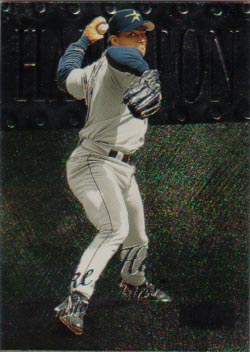 |
| 1999 Fleer Metal Universe # 12 |
| Now what if I were to say that Hunsicker was right to let this guy go? The 20/20 vision provided by hindsight makes this a lot easier to say, but so what: Hampton's 22-win season was a statistical anomaly, something so far beyond his normal standards that you can only call it a fluke. Hampton established personal bests in 1999 in the following categories: Wins, Fewest Losses, ERA, WHIP, Innings Pitched, and Strikeouts He tied career bests in two other categories: Games Started and Shutouts. Two years later, all those personal bests still stand. Hampton's win total for '99 is 46% better than any other figure he's posted. His ERA that year remains 8% better than any other number he's put up. His strikeouts: 17% better. His innings pitched for that year is 7% better than his second-best. WHIP: 6% better. And that adjusted ratio? 7% better. I think you see my point. But if you can't expect another '99 out of Hampton (and there's no shame in that, not really), what can you expect? Let's take a look. Now, we'll throw out his year in Seattle, when he was 20 years old and had a 9.53 ERA in 13 games. Let's also throw out 1994, his first year in Houston, when he didn't make any starts and made only 44 appearances. That leaves seven years to try and gauge the guy. Since 1995, Hampton has compiled a 96 - 62 record, which works out to an average of 14 - 9. And that's pretty accurate, coz if you look at it, you'll see that he's won 14 once (last year with the Rockies), and 15 twice ('97 with the 'Stros and 2000 in New York). He's never lost 9 in a single year, but has lost 10 three times. And since '95, Mike's compiled a 3.64 ERA. Now that particular figure is inflated; only twice did he finish the year with a number higher than 3.64: 1997, when he had a 3.83, and last year when he had that 5.41 with Colorado. We'll need to do something. So let's say Mike only gives up 100 (rather than 122) earned runs last year with the Rockies. Call it the Coors factor. That gets last year's ERA down to 4.43 and his seven-year totals to 3.50. And 3.50's a reasonable number; it was his career ERA through '99, and three times he's finished with a higher ERA, four times he's finished with a lower. |
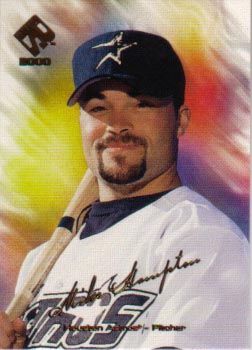 |
| 2000 Pacific Private Stock # 64 |
| So here we have a guy who had one of the greatest seasons by a lefty in the history of the game, yet remains a career 14 - 9 pitcher with a 3.50 ERA. He's good, no doubt. The National League cumulative ERA hasn't been at 3.50 since Bulldog was in high school, and the American League hasn't seen cumulative numbers that good since the year Hampton was born. But you can't reasonably expect him to repeat his '99 performance, and it took 5-3/4 million to sign him in 2000, then took 10-1/2 mil last year. The only pitchers making more in 2001 were Greg Maddux and Kevin Brown. Maddux (who's posted more wins than Hampton every year except '99) is a sure Hall of Famer, and Brown (who's posted a better adjusted ratio than Hampton every year except '99) may or may not get there based on his next couple seasons, but Hampton clearly does not belong in that company. Hampton's tenacity makes him an asset to any team he pitches for; and he is one of the better hitting pitchers of all times, but according to Baseball Reference.com, the pitcher with the career numbers most similar to Hampton's thus far is Jim O'Toole, who was sometimes very up, sometimes very down for the 1960's Reds. O'Toole, though an All-Star, never went 22 - 4, nor did he ever have an adjusted ratio of 1.50. Johnny Podres and Storm Davis are other names we see over there at Baseball Reference. Good, but not great, is what I am trying to say. And for 10 mil, I want great. And so, evidently, does Gerry Hunsicker. |
|





